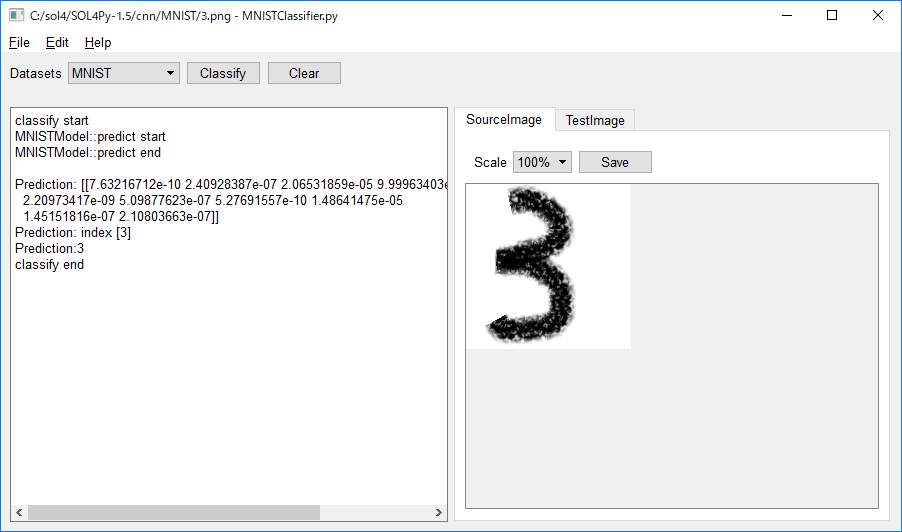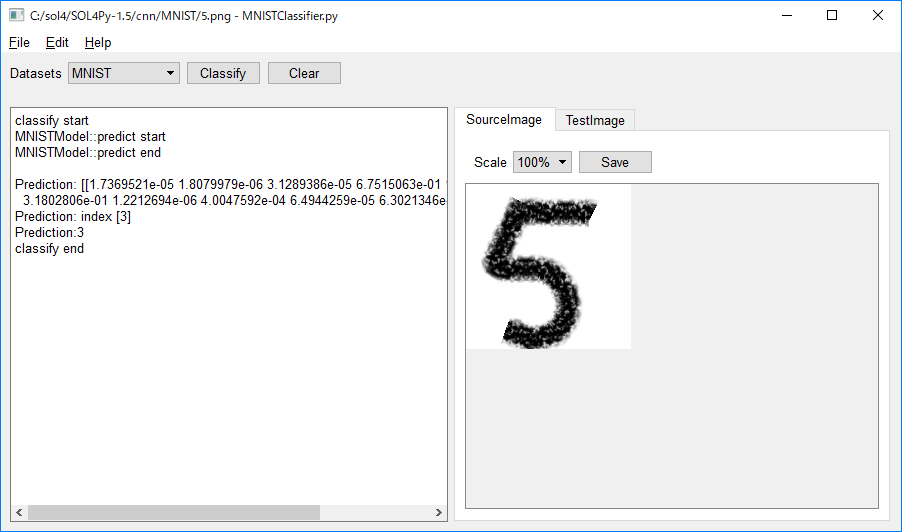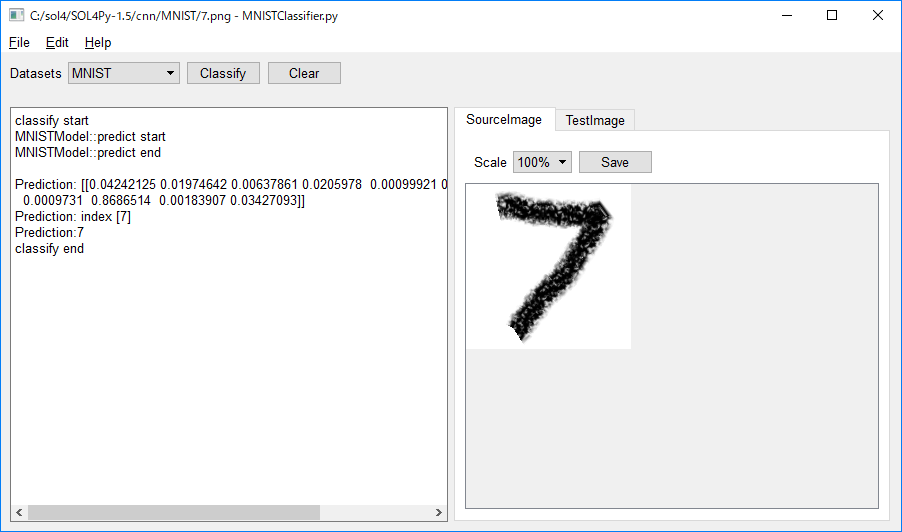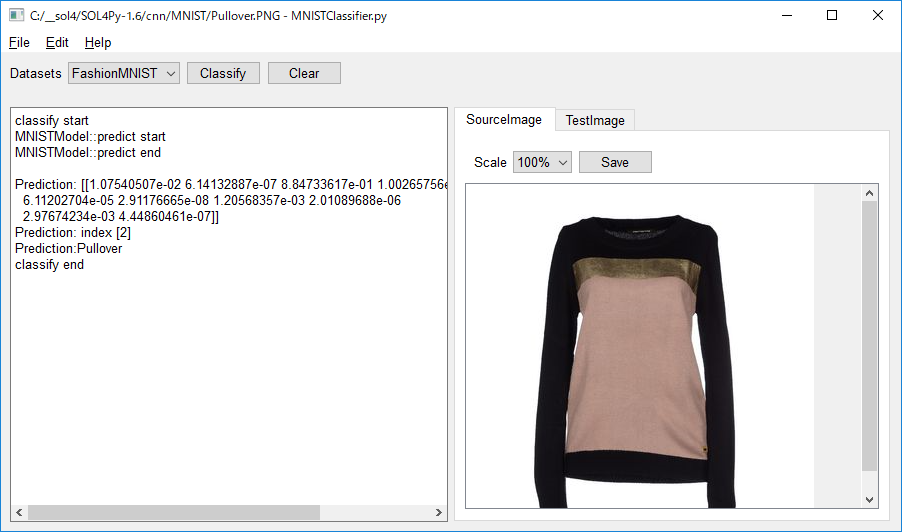|
SOL4Py Sample: MNISTClassifier
|





#******************************************************************************
#
# Copyright (c) 2018-2019 Antillia.com TOSHIYUKI ARAI. ALL RIGHTS RESERVED.
#
# This program is free software: you can redistribute it and/or modify
# it under the terms of the GNU General Public License as published by
# the Free Software Foundation, either version 3 of the License, or
# (at your option) any later version.
#
# This program is distributed in the hope that it will be useful,
# but WITHOUT ANY WARRANTY; without even the implied warranty of
# MERCHANTABILITY or FITNESS FOR A PARTICULAR PURPOSE. See the
# GNU General Public License for more details.
#
# You should have received a copy of the GNU General Public License
# along with this program. If not, see <http://www.gnu.org/licenses/>.
#
#******************************************************************************
# 2018/09/20
# 2019/09/13
# MNISTClassifier.py
# encodig: utf-8
import sys
import os
import time
import traceback
sys.path.append('../../')
from SOL4Py.ZImageClassifierView import *
from MNISTModel import *
MNIST = 0
FASHION_MNIST = 1
############################################################
# Classifier View
class MainView(ZImageClassifierView):
# Class variables
# ClassifierView Constructor
def __init__(self, title, x, y, width, height):
super(MainView, self).__init__(title, x, y, width, height,
datasets = {"MNIST": MNIST, "FashionMNIST": FASHION_MNIST})
self.class_names_set = [None, None]
# ndarry image datat created from keras.preprocessing.image
self.image = None
self.class_names_set[MNIST] = ["0", "1", "2", "3", "4",
"5", "6", "7", "8", "9"]
self.class_names_set[FASHION_MNIST] =['T-shirt/top', 'Trouser', 'Pullover', 'Dress', 'Coat',
'Sandal', 'Shirt', 'Sneaker', 'Bag', 'Ankle boot']
self.image = None
self.model_loaded = False
self.image_size = (28, 28)
# Load the trained model
self.model = MNISTModel(self.dataset_id, epochs = 10, mainv=self)
if self.model.is_trained():
self.model.load_dataset()
self.model.create()
self.model.load()
self.model.compile()
self.model.evaluate()
self.model_loaded = True
else:
print("You have to create a model file and weight file")
print("Run: python MNISTModel.py " + str(self.dataset_id))
QMessageBox.warning(self, "MNIST",
"Model/Weight File Missing.\nPlease run: python MNISTModel.py " + str(self.dataset_id))
self.show()
def datasets_activated(self, text):
self.dataset_id = self.datasets[text]
title = self.get_title()
self.setWindowTitle(text + " - " + title)
self.model.set_dataset_id(self.dataset_id)
self.classifier_button.setEnabled(False)
if self.model.is_trained():
self.model.load_dataset()
self.model.create() # 2019/09/13
self.model.load()
self.model.compile()
self.model.evaluate()
self.model_loaded =True
QMessageBox.information(self, "MNIST",
"OK: MNIST Model/Weight files loaded")
else:
print("You have to create a model file and a weight file.")
print("Please run: python MNISTModel.py " + str(self.dataset_id))
QMessageBox.warning(self, "MNIST",
"Model/Weight files missing.\nPlease run: python MNISTModel.py " + str(self.dataset_id))
def load_file(self, filename):
try:
image_cropper = ZPILImageCropper(filename)
# 1 Crop larget_central square region from an image of filename.
cropped_image = image_cropper.crop_largest_central_square_region()
# 2 Load an image from the cropped_fle.
self.image_view.set_image(img_to_array(cropped_image))
self.image_view.update_scale()
self.set_filenamed_title(filename)
# 3 Resize the cropped_image
self.image = cropped_image.resize(self.image_size)
# 4 Conver the self.image to a gray-scale image
self.image = self.image.convert('L')
self.image = img_to_array(self.image)
# 5 Set self.nadarryy to the test_image_view.
self.test_image_view.set_image(self.image)
# 6 Convert self.image in range[0-1.0]
self.image = self.image.astype('float32')/255.0
# 7 Expand the dimension of the self.image
self.image = np.expand_dims(self.image, axis=0)
except:
self.write(formatted_traceback())
def classify(self):
self.write("------------------------------------------------------------")
self.write("classify start")
self.write(self.filename)
try:
prediction = self.model.predict(self.image)
pred = np.argmax(prediction, axis=1)
class_names = self.class_names_set[self.dataset_id]
if pred >0 or pred <len(class_names):
self.write("Prediction:" + class_names[int(pred)])
except:
self.write(formatted_traceback())
self.write("classify end")
############################################################
#
if main(__name__):
try:
app_name = os.path.basename(sys.argv[0])
applet = QApplication(sys.argv)
main_view = MainView(app_name, 40, 40, 900, 500)
main_view.show ()
applet.exec_()
except:
traceback.print_exc()
Last modified:20 Sep. 2019




